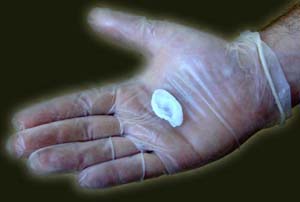The conventional treatments are relatively well known. Some patients also seek out other less well documented therapies, especially when they feel that established treatments have failed. It must be stressed, however, that the examples of alter¬native treatments are not ‘miracle cures’. Occasionally accounts of spectacular results are reported in the press or promotional books written by practitioners. Unfortunately, despite these public claims there are no proven cures and scientif-ically-controlled trials have so far failed to achieve the same results in other patients.
Generally, complementary therapies are used alongside conven¬tional therapy There is no reason why you and your relative should -not find out about, or use, complementary therapies alongside ‘orthodox treatments if you so wish. Sometimes such therapies can bring relief during stressful times for you and your relative; many complementary therapies have been practised for centuries bring¬ing emotional and physical relief. Reputable therapists never make direct claims that their methods will cure a disease; instead they will support the view that natural therapies may help to promote healing. The important advice is to use the therapies sensibly and to work with the orthodox cancer team.
The non-traditional treatments listed below are given as examples only and do not cover the full range of therapies.
 Complementary therapies
Complementary therapies
Acupressure is an ancient skill practised in China and Japan for over 3,000 years. It combines massage with acupuncture principles and is thought to have been the forerunner of acupuncture. It does not use needles. Acupressure is believed to improve the body’s healing powers, prevent illness and pro¬mote energy. Practitioners work on known pressure points with thumbs, finger tips, etc, to balance the flow of energy called Qi, which runs throughout the body via meridians or invisible channels. Acupressure relieves the symptoms of many conditions and is best used in conjunction with other natural or orthodox treatments. – Aromatherapy combines the restorative properties of aromatic plant essences with the soothing effects of gentle massage. This therapy is a good one to try if complementary treatments are new to you.
– Faith healing is based on the belief that positive or ‘right’ thinking can cure or relieve illness. The belief is particularly strong when practised within a religious setting where healing through spiritual means is preached. Patients are attended by non-medical healers who believe that faith healing enhances the body’s natural defences by reducing the effects of stress. It can reinforce the mental attitude of patients so that they feel better even though their condition may not be improved.
– Homeopathy relies on the principle of treating like with like, whereby minute quantities of a natural substance are given to stimulate the body’s own healing power.
– Reflexology involves massaging areas of the body (mainly the feet) which practitioners believe helps to free blockages in energy pathways.
Alternative therapies
– Naturopathy is an approach to ‘natural healing’ where no drugs (or radiotherapy) are used and the belief in cures is based on special diets, exercise and practical therapies. Natur¬opathy concentrates on helping the body to cure itself. Like faith healing it encourages people to think positively about their problem and not to concentrate on the negative aspects of the illness. Practitioners attempt to identify the underlying cause of the illness and to treat this rather than deal with the symptoms. Each person is treated as an individual and the therapist takes an holistic (whole body) approach. They seek to complement and support traditional medicine.
– Bristol Cancer Help Centre opened in 1980 with a clear vision to provide a new, holistic approach for cancer patients that offers a link between orthodox medicine and the comple¬mentary therapies and care. The ‘approach’ promoted by the Centre uses a combination of therapies and self-help tech¬niques focusing on the patient’s emotional and spiritual health and state of mind. The therapy works alongside medical treat¬ment to confront fears and teaches that the patient has control over many of the important factors that affect health.
The Centre staffs believe that people who react with a positive approach to the diagnosis of cancer are more able to help them¬selves. For example, the Centre teaches that patients can strengthen their immune system and thus enhance their potential for recovery.
The Bristol Cancer Help Centre therapy programme comprises a starter pack, an introductory course, a residential course, follow-up days and telephone support. It must be noted that the approach promoted by the Centre is an alternative form of therapy that should complement, not replace, orthodox treatment. Many patients who have used the services of the Centre find the facilities and self-help elements very supportive.
